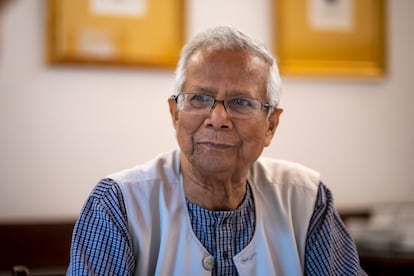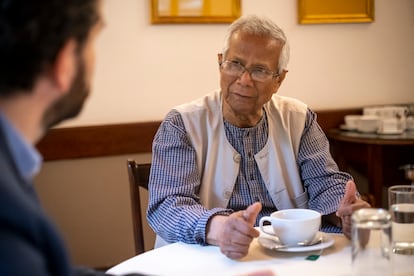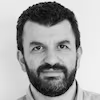Muhammad Yunus: ‘The world is more in crisis than ever before’
In an interview with EL PAÍS, the Nobel Peace Prize laureate defends his theory of the ‘three zeros’: zero climate change, zero concentration of wealth and zero unemployment

Muhammad Yunus, the winner of the 2006 Nobel Peace Prize for his work to “create social and economic development from below,” exudes serenity. The “world’s banker to the poor” receives EL PAÍS minutes before leading a panel that celebrates 10 years of the work of his organization Yunus Social Business in Colombia. The 82-year-old Bangladeshi social entrepreneur answers our questions while sipping a cup of tea, never raising his voice and with the same sort of unconcern with which he states that he does not feel the altitude (Bogotá is 2,600 meters above sea level). His calm demeanor contrasts with his understanding of the world and his belief that humanity is at the brink of extinction, but is explained by his certitude that a deep change in the social and economic system is about to come and save humankind.
Question. How do you see the world today?
Answer. It’s more in crisis than ever before. Before the pandemic, we were saying that we were in crisis, with global warming and everything else. We had no idea that there would be something worse waiting for us. And suddenly the world changes and for two and a half, or two years, people are behind doors, businesses are stopped, people lose their jobs, and many people become poor. And this is not something that happened to the Third World, it’s not just some poor countries that have some problems. It’s the whole world. So that’s a transition that was completely unexpected. Then came the war in Ukraine, that transformed the whole world more than ever before, because you cannot find one single person who has not been negatively impacted. And it is going to get worse and worse.
Q. So you’re pessimistic.
A. Look, this is the direction it’s going. Many countries are preparing or talking about facing a famine. So now you have a pandemic, shortage of food and inflation is everywhere, there is talk about recession and so on… In the midst of it, we are convening COP27, and I ask myself: “Will they discuss global warming right now?” It’s an issue that’s been pushed to the back of the agenda. If you want to address global warming, you have to face the elephant in the room. That’s the war. Every day of war is pushing global warming towards the back. You’re undoing everything, you’re opening the door to fossil fuel. And I was just talking to someone in Germany who said that all the money that was allocated for global warming is now gradually being moved into the defense budget. So the agenda at COP27 must be how to stop the war. Forget about global warming, because unless we do that, that is not going to happen. So this is the direction we are in because we are facing a crisis which the world has never seen before. Global warming is going to destroy us anyway. We keep talking about an existential crisis? It’s true, more so today than ever before.
Q. Do you see a way out?
A. Yes. Because if you have to survive, you have to find a way. There’s no other option. Otherwise, you just surrender. But luckily, human beings are not used to surrendering, they always come up with something in desperate situations. This is the time when they have to do that. One issue that I have discussed many times, and continue to discuss, is that the civilization that we are living in was designed for disaster. It was going to kill us anyway. Global warming was one expression of destroying it, and this civilization has no way to handle it. We go around, have a chat, discuss it over a cup of tea. That’s not how fires are extinguished. It’s when you roll up your sleeves, forget everything you’re doing, go out and stop the fire. But we’re putting it on the sideline. CEOs are contributing to it a little bit, but [global warming] is not a repair job. My conclusion is that this civilization is a sinking ship. The solution is to quickly build a new ship. That’s a new civilization.
Q. What sort of new civilization?
A. The main problem with the old civilization is it forgot that we are human beings, it designed us into moneymaking robots. The new civilization will be based on human values such as sharing or caring, all the good things we say about human beings. Otherwise, we have no chance. We talk about creating a new civilization of three zeros. One is zero global warming, that will be the identity of the new civilization. Zero, nothing less than that. Another is zero wealth concentration, because we have a machine which feeds the wealth to concentrate wealth among a few people, and that is not a tenable situation. Number three is the massive amount of unemployment, and we must create a world based on entrepreneurship rather than job seeking. I keep saying that human beings are born entrepreneurs, that we have a creative capacity that can change the world, and we must unleash it. But we forget it, as if we have to go back to slavery and work for somebody else.

Q. And how will this change be brought about?
A. I invite young people to create the three zeros. Each club member decides to bring his or her contribution to bringing global warming to zero. So they move from seeing global warming as a global issue to an individual issue. This little demonstration is important to convince others. If you can create three zero clubs and become three zero people, one of 10 of them, then the next step will be creating three zero families, then zero communities… We have more than 500 clubs in 38 countries. We don’t know who they are, where they are, what language they speak, but they join me in saying this is a commitment of yours that we want to follow. This does not mean that we stop building the framework to make it possible, but this is the model I look to create, for companies as well.
Q. And do you think it’s starting to happen? To what degree?
A. It’s happening because that’s what brought me here. That’s the very reason why you are here asking me this question. Otherwise, who cares? We have lots of social businesses that are not in the business to make money, but to change the world. They show that the essence of civilization is not making money, but solving problems. So we are moving forward.
Q. Your idea is empowering. It could help people to face problems as big as global warming.
A. Exactly. Our approach is about redesigning the economy, and social business is at the core of that. The social business is a company that’s 100% focused on solving a social or environmental problem, not like any old business that looks for the problem no to be as bad as it was last year. They are profitable, but that money gets plowed back into the business to solve more of those problems. That’s empowering because you feel you can do something small, concrete. And you can do it and everyone can, because business is something much closer to us, we don’t have to engage with politics. That’s the incredible power of this solution, and that’s what we’re trying to implement around the world.
Q. Why should people get into social business and not traditional business?
A. People ask me: “Why should I get into social business? There’s zero return for me.” The answer, I think, is very simple. You pursue more money to be happier. So I say making money may bring happiness, but making other people happy is a super happiness. They say: “I don’t know,” and I say: “You have to try it out, like trying new food. Once you try it, you’ll understand it and love it.”
Q. But is it happening fast enough? Because global warming, famine, war are affecting us now.
A. That’s why I’m here. We were at the presidential palace; although the president [Gustavo Petro] was not there, he very much wanted to have a discussion with me. So he instructed his ministers to do so. There were five ministers, not one, including the ministers of defense and labor. And we didn’t just speak for 15 minutes, we spoke for four hours. What can we do with government? Something, because it’s a new government that is looking for ideas, and they are interested. I didn’t expect the president to invite me. So you don’t change the world overnight, all you do is take a baby step. We don’t have the machinery, we are no government, we’re not a big business to bring the three zeros ideas to everyone.
Tu suscripción se está usando en otro dispositivo
¿Quieres añadir otro usuario a tu suscripción?
Si continúas leyendo en este dispositivo, no se podrá leer en el otro.
FlechaTu suscripción se está usando en otro dispositivo y solo puedes acceder a EL PAÍS desde un dispositivo a la vez.
Si quieres compartir tu cuenta, cambia tu suscripción a la modalidad Premium, así podrás añadir otro usuario. Cada uno accederá con su propia cuenta de email, lo que os permitirá personalizar vuestra experiencia en EL PAÍS.
¿Tienes una suscripción de empresa? Accede aquí para contratar más cuentas.
En el caso de no saber quién está usando tu cuenta, te recomendamos cambiar tu contraseña aquí.
Si decides continuar compartiendo tu cuenta, este mensaje se mostrará en tu dispositivo y en el de la otra persona que está usando tu cuenta de forma indefinida, afectando a tu experiencia de lectura. Puedes consultar aquí los términos y condiciones de la suscripción digital.









































